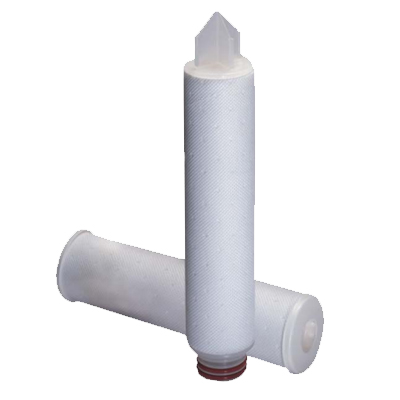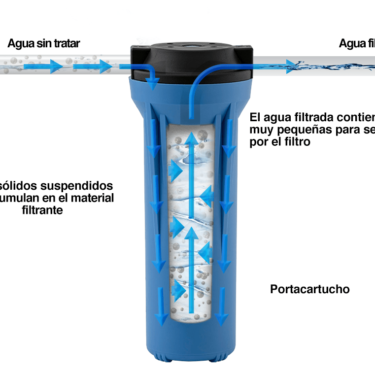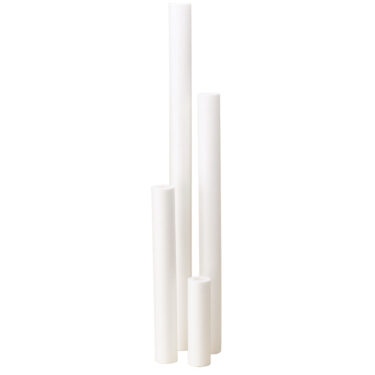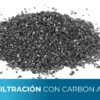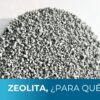It should be considered that the water coming from the municipal network contains sediments that may not be easily perceptible to the human eye, since the eye can only see particles larger than 40 microns (μm) so that, although tap water may appear to be safe to be consumed and ingested directly, it contains contaminants that come from the same piping system and inadequate treatment systems that do not remove all contaminants due to a lack of general maintenance on the distribution network and poor quality control.
Sediment filters for water
There are a variety of sediment filters for water purification and treatment ranging from small cartridges for home water purifiers to large replacement parts that are intended for use in industrial environments.
It will depend on multiple factors which of these filters is most appropriate for your situation, such as the quality of the source water, the chemicals present, and the size of the particles you are looking to remove.
Here you will find all the information you need on how these cartridge sediment filters improve water quality, including details on how they work, the various models available, their distinguishing features and how they are classified.
You can also contact our team of engineers to help you find the right cartridge for your residential, commercial or industrial water purification or treatment equipment.
Filtros de cartucho
Ver catálogo completo.-
Sterilizing Grade Pharmaceutical Liquid Filters – PROPOR SG
Add to quote -
Parker Honeycomb™ Industrial Winding Filter
Add to quote -
Parker Flo-Pac Filter Cartridges
Add to quote -
Parker DuraBond™ Heavy Duty Meltblown Filter
Add to quote -
MegaBond Nominal Melt Blown Filter Cartridges
Add to quote -
BEVPOR PS – Final Microbial Stabilization Filter Cartridge
Add to quote -
Polyflow-G Pleated Depth Filter Cartridge
Add to quote -
Abso-Mate™ Pleated Melt Blown Filter Cartridges
Add to quote -
3M Industrial DuoFlo Bag Filter
Add to quote -
3M High Flow Cartridge
Add to quote -
3M 740B series High Performance Cartridge
Add to quote -
3M Betapure NT-T Cartridge
Add to quote -
3M Betapure AU Cartridge
Add to quote -
Aquex Pleated Cartridges
Add to quote -
Polyspun Aquex cartridges.
Add to quote -
Hydronix SBC Series Hot Melt Depth Cartridges
Add to quote -
3M Zeta Plus H / C Series filter cartridges
Add to quote -
3M Micro-Klean RT Cartridge
Add to quote -
Polydepth Pentek Cartridge
Add to quote -
Inline Sediment Filter Cartridge ISF-10
Add to quote -
Polyspun 4.5 “x20” Hydronix Cartridges
Add to quote -
Polyspun 4.5 “x10” Hydronix Cartridges
Add to quote -
Polyspun 2.5 “x40” Hydronix Cartridges
Add to quote -
Polyspun 2.5 “x30” Hydronix Cartridges
Add to quote -
Polyspun 2.5 “x20” Hydronix Cartridge (Polishing Filter)
Add to quote
3M sediment filters are ideal for industrial applications and laboratory use thanks to their advanced technology present in their various brands such as Betapure, Betafine, Micro-Klean, ZataPlus and LifeASSURE.
Filtros de sedimentos marca 3M
Ver todos los productos.-
3M Industrial DuoFlo Bag Filter
Add to quote -
3M High Flow Cartridge
Add to quote -
3M 740B series High Performance Cartridge
Add to quote -
3M Betapure NT-T Cartridge
Add to quote -
3M Betapure AU Cartridge
Add to quote -
Water Purifier DWMX1 3M Filter
Add to quote -
3M Zeta Plus H / C Series filter cartridges
Add to quote -
3M Betafine XL / DP Filters
Add to quote -
3M Bag Filter NB Series
Add to quote -
3M Micro-Klean RT Cartridge
Add to quote -
3M Water Purifier MX-60 replacement cartridge DWMX1
Add to quote
Filtros de sedimentos marca Parker
Ver todos los productos.-
Parker EH Stainless Steel Single Filter Housing EH
Add to quote -
Sterilizing Grade Pharmaceutical Liquid Filters – PROPOR SG
Add to quote -
Fulflo SB single and multiple bag filter housing made of carbon or stainless steel with ASME code
Add to quote -
Parker Honeycomb™ Industrial Winding Filter
Add to quote -
Parker Fulflo SF Multi-Cartridge Filter Vessels
Add to quote -
Parker Flo-Pac Filter Cartridges
Add to quote -
Parker DuraBond™ Heavy Duty Meltblown Filter
Add to quote -
Parker PHL Liquid Housing Range
Add to quote -
Parker EH Parker 304 and 316L Stainless Steel Multi-Cartridge Filter Housings
Add to quote -
MegaBond Nominal Melt Blown Filter Cartridges
Add to quote -
BEVPOR PS – Final Microbial Stabilization Filter Cartridge
Add to quote
Depth filters
In this type of filtration, the suspended particles pass through the filter body, which is made up of several layers. In these sediment filters, contaminants do not only remain on the surface of the material, as larger particles are captured in the outer layers, while smaller particles penetrate deeper and are trapped in inner layers throughout the filter body. This is due to the gradual decrease in pore size from the outer surface to the inside of the sediment filter.
Among their benefits we can mention that they are especially useful when fine filtration and high contaminant retention capacity are required. This efficiency in filtration capacity has a positive impact on the filter's service life.
More informationSurface filters
In this type of filtration, sediments are retained in the surface layer instead of being retained through the sediment filter body. Due to its construction, it is possible that contaminants accumulate faster in the filter, so that the renewal and maintenance of the system is more frequent, otherwise the flow of treated water passing to the rest of the system could be affected by the solids that prevent the passage of water.
Due to their characteristics, they have a higher micron size, which is indicated to retain larger particles compared to depth filters.
More informationWhat are sediment filters used for?
If these sediments reach the other water treatment components, they could cause blockages, generate bacterial growth or damage reverse osmosis systems by saturating their membrane.
This is why water treatment equipment for industrial, commercial or residential applications requires sediment filters that remove the largest amount of suspended particles to obtain quality water.
What are sediments or suspended solids in water?
Sediments are particles in suspension and therefore not dissolved in the water, which is why they commonly modify the appearance of the water, as they do not settle by gravity to the bottom. To mention a few examples we can find organic debris and organic matter, sand, clay, grid oxide or colloids.
Sediment in the water can come from a variety of sources, such as pipe corrosion, residues from soil erosion, and entrained particles that came directly from the source from which it was extracted. Although some of these sediments may be imperceptible, there is a possibility that they may contain contaminants or encourage the growth of microorganisms, posing a health risk if ingested.
How do sediment filters work?
Water, as previously explained, despite appearing to be free of contaminants at first glance, actually has elements that make it unsuitable for various uses, especially if it is to be used for the preparation of food, beverages or any other human consumption.
Particles in suspension in the water are responsible for affecting transparency by increasing the turbidity of the liquid. Water with high turbidity will have an appearance, taste, odor and microorganisms such as viruses and bacteria making it unfit for use.
Physical filtration of sediments.
Sediment filters are intended to improve water quality by reducing suspended solids through mechanical filtration in which untreated water flows through a filter media in a cartridge composed of e.g. polypropylene, cellulose, nylon or polyester. The choice of a filter type will depend on the water source and the application for which it is needed as these will condition the physical and chemical characteristics required by the sediment filter.
Filtration capacity.
The capacity that different types of sediment filters have to retain particles in water depends on their pore size which is measured in microns (μm) which is one millionth of 1 meter or one thousandth of a millimeter (to learn more about microns see the article: What are micrometers, microns or microns?). For example, if the pores of a sediment filter measure 5 microns, any solids suspended in the water that are larger than 5 microns in size will be physically retained.
The efficiency of these filters depends on the capacity of the filter media to retain particles without clogging quickly. The service life of a cartridge filter depends on the sediment load in the water and the frequency with which these sediments accumulate in the filter.
Polyspun filter
Spun filter
Pleated filter
Filter bag
Polyspun filter
Sediment filters made of polypropylene, a thermoplastic material with high chemical and physical resistance, which makes it ideal for water treatment. As they are chemically inert, they do not modify the taste, odor or color of the water, and they do not react to the chemicals that may be present in the water to be treated.
They are capable of maintaining their structural integrity under varying pressures and temperatures, making them suitable for use in demanding industrial conditions. In addition, their resistance to bacterial degradation makes them more hygienic and safe for use in drinking water systems.
In terms of maintenance and cost, polyspun filters are an economical and low-maintenance option. Its design allows for easy cleaning and replacement, contributing to an efficient and prolonged operation of the filtration system. These features make polyspun filters a versatile and reliable solution for a wide variety of water treatment applications, from domestic to industrial and commercial applications.
Spun filter
Sediment filters that are constructed from ropes or yarns, made from polypropylene, cotton, polyester, rayon or nylon, are another effective filtration option for filtering particles in water.
Designed for residential and commercial use, these filters are easy to replace and available in various sizes. High temperature resistant, they withstand up to 73°C and depending on the manufacturer can operate in a wide temperature range from 4.4 °C to 73.9 °C. These characteristics provide durability and efficiency even with viscous liquids.
Pleated filter
Pleated sediment filters are filtration cartridges with a particular design that allows them to have a larger surface area to retain sediments. Filtration takes place through the pleats of its structure, where the fibers of the filter material physically retain the particles on the surface, while some others are attracted to the interior of the material.
Among the main advantages of these filters are that they are economical, they generate a low pressure drop compared to polyspun filters (depth filters) and, in addition, depending on the quality of the treated water, they can be reused from 1 to 3 times.
Filter bag
In this type of sediment filter, the water flows through the bottom wall of the filter in the form of a bag, which causes the suspended particles to be retained at the bottom, and also has the capacity to retain viscous fluids.
With continued use, contaminants accumulate at the bottom of the bag, which increases the differential pressure across the filter. This buildup of contaminants causes resistance to fluid flow, signaling the need to replace the sediment filter bag.












